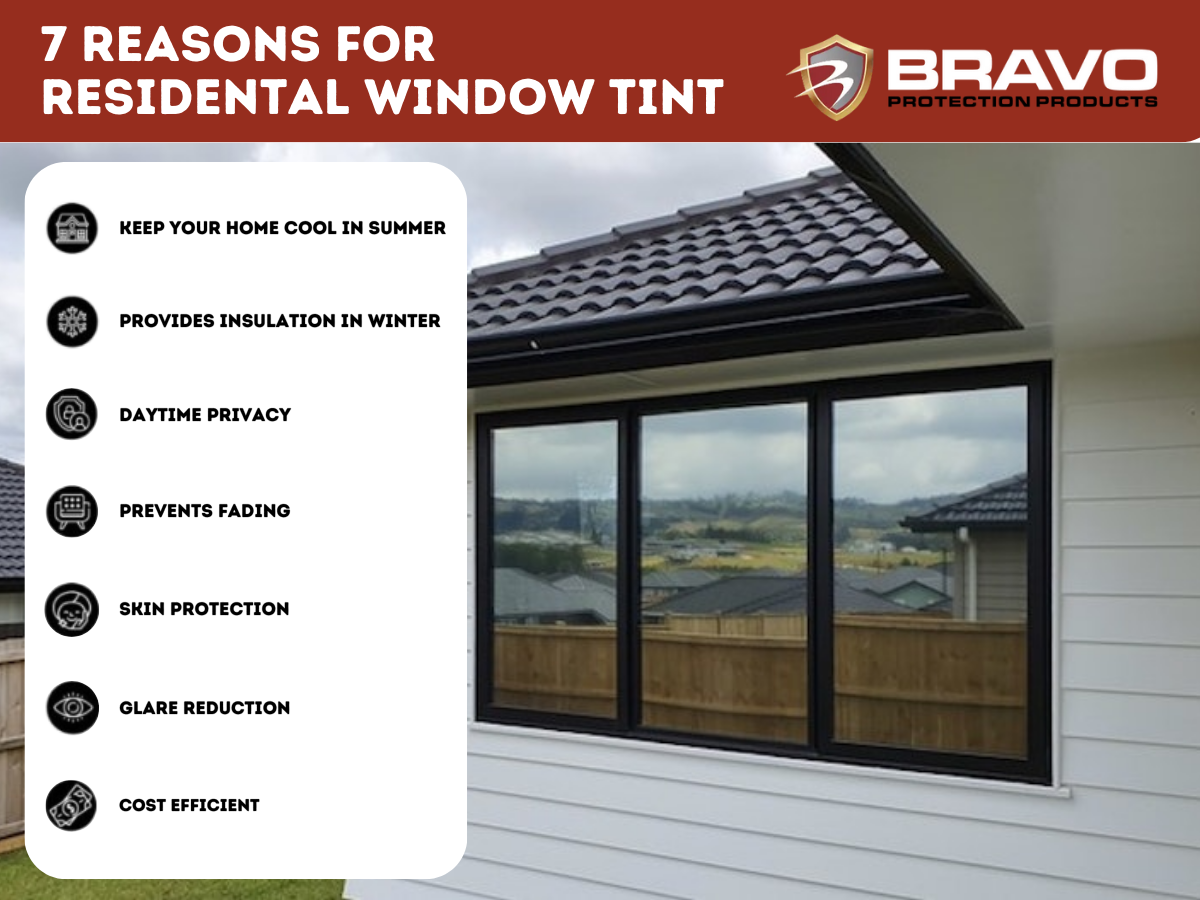Residential Window Tint: Block Harmful Rays Without Sacrificing All-natural Light
Residential Window Tint: Block Harmful Rays Without Sacrificing All-natural Light
Blog Article
How Residential Window Tinting Boosts Your Home's Power Efficiency
Residential window tinting presents a compelling service for home owners seeking to enhance power effectiveness within their living rooms. By applying specialized movies to windows, it properly minimizes warmth transfer, thus maintaining interior temperatures and minimizing the demand for excessive home heating or cooling.
Comprehending Window Tinting
Understanding window tinting is important for homeowners seeking to boost both comfort and energy effectiveness in their home. Residential Window Tint. Home window tinting entails the application of a slim film to the inside or exterior surface of glass windows. This movie can considerably modulate the quantity of sunshine and heat that enters a home, thus affecting indoor climate problems
There are different kinds of home window tinting films offered, each with distinct buildings. The effectiveness of home window tinting is often measured by its Visible Light Transmission (VLT) percent, which suggests how much light can pass through the film.
Benefits of Power Performance
Home window tinting not only improves visual appeals but also plays a significant role in boosting power efficiency within domestic rooms. By reducing warm transfer with home windows, tinted films produce a much more secure indoor environment, which can lead to substantial decreases in energy consumption for cooling and heating. This energy performance equates right into lower energy expenses, offering property owners with substantial lasting financial savings.

Furthermore, home window tinting enhances the comfort of living spaces. By lessening glow and blocking unsafe UV rays, tinted home windows create an even more positive atmosphere, which can bring about enhanced health for owners. The protection against UV rays likewise assists protect furnishings and floor covering from fading, adding to the durability of household products.
Just How Tinting Works
Tinting movies operate with a combination of advanced products and innovations developed to control the quantity of solar power getting in a home. Mainly made up of polyester, these films typically include ceramic or metal particles that take in and reflect warm. This double ability permits them to substantially minimize the infiltration of ultraviolet (UV) rays and infrared radiation while allowing noticeable light to pass through.
The efficiency of home window tinting is gauged by its solar heat gain coefficient (SHGC), which indicates just how much solar power is transferred with the home window. Lower SHGC values are more effective as they denote greater warmth denial. Additionally, home window colors can include a variety of shades, allowing house owners to tailor their visual choices while enhancing energy effectiveness.
In addition, these films serve as an obstacle, avoiding warmth loss during chillier months by reflecting interior warmth back right into the space. This thermal insulation result enhances the air conditioning advantages acquired during warmer months, adding to a balanced interior environment year-round. By handling solar energy properly, household window tinting not just boosts comfort but additionally plays an important duty in lowering power intake and lowering energy bills.
Picking the Right Tint

There are different kinds of window movies readily available, consisting of colored, metalized, and ceramic. Colored films are economical but might have restricted longevity. Metalized movies offer far better warm being rejected but can hinder electronic signals. Ceramic films offer exceptional warmth control without jeopardizing presence and are highly long lasting, making them a preferred selection.
Noticeable light transmission (VLT) is one more crucial aspect, as it suggests the quantity of natural light that can go through the tinted glass. Property owners ought to choose a color with a VLT that enhances their illumination preferences while still supplying ample glow decrease.
Additionally, assessing the solar warm gain coefficient (SHGC) can help determine how well a tint can block heat from sunshine. A reduced SHGC shows better warm control, eventually enhancing power efficiency.
Installment and Maintenance Tips
Proper setup and maintenance are essential parts in making best use of the benefits of household home window tinting. To achieve ideal results, it is advisable to employ a qualified professional for installment. This makes sure that the color is used correctly, staying clear of air bubbles, creases, or imbalance that could compromise efficiency. Professionals likewise use specialized strategies and tools, which this link can enhance the durability and click effectiveness of the tint.
Adhering to installation, upkeep is vital to lengthen the life of the window movie. It is advised to wait at least 30 days prior to cleaning up the colored home windows to allow the glue to heal totally.
Additionally, regular inspections are helpful. Look for any type of peeling or bubbling, which can show improper installation or use in time - Residential Window Tint. Resolving these problems immediately can protect against additional damages and maintain energy effectiveness. By sticking to these installment and upkeep pointers, homeowners can guarantee their home window tinting proceeds to give substantial energy financial savings and convenience for several years to come.
Final Thought
In conclusion, domestic home window tinting serves as a reliable remedy for improving energy effectiveness within homes. By lowering heat transfer and obstructing damaging UV rays, home window films add to decrease energy consumption and boosted indoor convenience.
Home window tinting involves the application of a slim film to the interior or exterior surface area of glass windows. By lowering heat transfer via windows, tinted movies produce a more stable interior environment, which can lead to substantial decreases in energy important site consumption for home heating and air conditioning.The effectiveness of home window tinting is measured by its solar warm gain coefficient (SHGC), which suggests how much solar power is sent through the window. By taking care of solar energy successfully, property home window tinting not only enhances comfort yet likewise plays an essential function in minimizing power consumption and reducing utility bills.
By lowering heat transfer and obstructing dangerous UV rays, window movies contribute to lower energy consumption and improved interior comfort.
Report this page